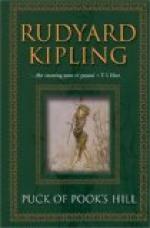’"No need,” said De Aquila, and he laid his hand on the parchments which Gilbert had written. “It shall be some part of my Gilbert’s penance to copy out the savoury tale of thy life, till we have made ten, twenty, an hundred, maybe, copies. How many cattle, think you, would the Bishop of Tours give for that tale? Or thy brother? Or the Monks of Blois? Minstrels will turn it into songs which thy own Saxon serfs shall sing behind their plough-stilts, and men-at-arms riding through thy Norman towns. From here to Rome, Fulke, men will make very merry over that tale, and how Fulke told it, hanging in a well, like a drowned puppy. This shall be thy punishment, if ever I find thee double-dealing with thy King any more. Meantime, the parchments stay here with thy son. Him I will return to thee when thou hast made my peace with the King. The parchments never.”
’Fulke hid his face and groaned.
’"Bones of the Saints!” said De Aquila, laughing. “The pen cuts deep. I could never have fetched that grunt out of thee with any sword.”
’"But so long as I do not anger thee, my tale will be secret?” said Fulke.
’"Just so long. Does that comfort thee, Fulke?” said De Aquila.
’"What other comfort have ye left me?” he said, and of a sudden he wept hopelessly like a child, dropping his face on his knees.’
‘Poor Fulke,’ said Una.
‘I pitied him also,’ said Sir Richard.
’"After the spur, corn,” said De Aquila, and he threw Fulke three wedges of gold that he had taken from our little chest by the bedplace.
’"If I had known this,” said Fulke, catching his breath, “I would never have lifted hand against Pevensey. Only lack of this yellow stuff has made me so unlucky in my dealings.”
’It was dawn then, and they stirred in the Great Hall below. We sent down Fulke’s mail to be scoured, and when he rode away at noon under his own and the King’s banner, very splendid and stately did he show. He smoothed his long beard, and called his son to his stirrup and kissed him. De Aquila rode with him as far as the New Mill landward. We thought the night had been all a dream.’
‘But did he make it right with the King?’ Dan asked. ’About your not being traitors, I mean.’
Sir Richard smiled. ’The King sent no second summons to Pevensey, nor did he ask why De Aquila had not obeyed the first. Yes, that was Fulke’s work. I know not how he did it, but it was well and swiftly done.’
‘Then you didn’t do anything to his son?’ said Una.
’The boy? Oh, he was an imp! He turned the keep doors out of dortoirs while we had him. He sang foul songs, learned in the Barons’ camps—poor fool; he set the hounds fighting in Hall; he lit the rushes to drive out, as he said, the fleas; he drew his dagger on Jehan, who threw him down the stairway for it; and he rode his horse through crops and among sheep. But when we had beaten him, and showed him wolf and deer, he followed us old men like a young, eager hound, and called us “uncle”. His father came the summer’s end to take him away, but the boy had no lust to go, because of the otter-hunting, and he stayed on till the fox-hunting. I gave him a bittern’s claw to bring him good luck at shooting. An imp, if ever there was!’




